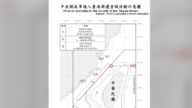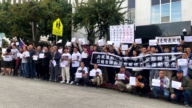【新唐人2012年12月17日讯】中国数十名廉政专家15号在广州开会。专家们在“第二届中国廉政制度创新学术研讨会”上,热烈倡议反腐,广东官员则声称要积极开展反腐试点。也有学者提出“廉政特区””的构想。“复旦大学”教授,全国政协常委葛剑雄接受本台记者采访时指出,中共新领导层热热闹闹的反腐大戏,跟过去诸多的反腐运动一样,难有成效。他认为,只有广大群众参与才能成功反腐。下面一起来听听他怎么说。
在研讨会上,广东省纪委官员王兴宁表示,广东正在进行制度改革和创新,将积极学习借鉴香港“廉政公署”的做法和经验,更好的将反腐纳入制度化。
王兴宁说,广东正在开展反腐试点工作,比如推行公共用车制度改革,推进领导干部家庭财产申报试点工作,并已经选择三个地方进行试点。
自从中共政权新领导层上任以来,总书记习近平特别强调反腐的迫切性,声称“腐败可能亡党亡国”。
可是“复旦大学”历史学教授,全国政协常委葛剑雄对《新唐人》表示,中共官场腐败泛滥。他对新领导层轰轰烈烈发动的的所谓“反腐运动”不抱太多希望。
“复旦大学”历史学教授葛剑雄:“我觉得中国大部分官员层都贪。经常也在新闻里看到,中央和政府搞反腐败。没有看到什么太大的效果。”
但是,葛剑雄又说,“新官上任三把火”,当局总会试图抓一些贪官,所以,谁被烧到算谁倒霉。
另外,在广州的研讨会上,“北京航空航天大学公共管理学院”教授任建明,提出了“廉政特区”的构想。他说,所谓“廉政特区”,就是把中国的一些地方,设立为能够深入、综合进行反腐败的改革试验区域。他并推荐把深圳前海和珠海横琴作为“廉政特区”。任建明指称,“廉政特区”可以在5到10年内取得成功。
但葛剑雄教授认为,这些举措不可能杜绝腐败。
葛剑雄:“这个我估计不可能。我感觉不怎么现实。反正反腐历朝历代都在说这个事。贪官是源源不断的。这个下台了,可能另外一个马上就上台了。只要有官员的地方,有阶级层次的地方,肯定会有一些腐败行为。”
葛剑雄认为,由政府主导的反腐败难有成效。只有让人民大众参与,在制度的监督下,才能取得反腐败的成功。
葛剑雄:“就像现在这些网络,只有这些民众参与我感觉才能搞好。如果单单指望某一单位去搞这个东西,我估计很难搞好这个东西。我感觉必须要平民大众都参与这个事情,才能搞好。”
除此之外,“香港教育学院社会科学系”博士生刘九龙,在广州的研讨会上提交了《中国内地落马官员带“病”提拔现象研究》论文。论文分析了中国内地2002年到今年落马的43名省部级官员,所谓“带病”被提拔,也就是一边腐败一边升官的现象。
刘九龙的研究发现,从官员因腐败落马的级别来看,副省级的占了3/4。而从初次腐败行为的级别来看,厅级官员占据总数的3/4。可以看出,很多官员基本都是在升迁一到两级,成为副省级干部以后,才被抓落马。
刘九龙的研究还发现,官员初次腐败行为的平均年龄为47岁,而被发现腐败时的平均年龄为58岁。这些所谓“带病”被提拔的省部级官员,平均经济腐败事件在10年左右。
据新浪网报导,近年来的官员财产公示试点地区,多数地方只针对“拟提拔干部”的家庭财产,在内部进行公示,而科级干部成为主要的公示对像。
浙江慈溪市、江苏淮安市等地的改革试点,涉及县处级干部,但是公示平台多选择在单位内部或者局域网公示,公众无法看到。
采访编辑/秦雪 后制/葛雷
Scholar Proposes Special Region against Corruption in Guangdong
Dozens of Chinese experts in Anti-Corruption
met in Guangzhou on the 15th.
In the second annual symposium on integrity (honest government) system and innovation,
experts proposed to initiate an anti-corruption
pilot station in response to the initiative.
Special regions against corruption were also proposed.
Ge Jianxiong, Professor of Fudan University and Standing
Committee of the National Committee of the Chinese People’s Political Consultative Conference,
told NTD that he does not believe there is any use for it.
The anti-corruption under the new leadership
will fail like many other movements in the past.
The success of anti-corruption has to depend on
the public’s participation. The following is our report.
In the symposium, member of the Guangdong Provincial
Commission for Discipline Inspection, Wang Xingning,
introduced reform and innovation in Guangdong.
It will institutionalize anti-corruption following the
practices and experiences of Hong Kong Independent Commission Against Corruption.
Wang Xingning mentioned three regions have been chosen
for an anti-corruption pilot study in Guangdong.
Policies such as transportation system for the officials,
and declaration of leading cadres’ family asset are implemented.
Since taking over the leadership of the Chinese Communist
regime, Xi Jinping particularly emphasized on the urgency of fighting corruption.
He claimed that corruption may lead to the ruin of
the Party and the regime.
History professor at Fudan University, Ge Jianxiong,
told NTD that corruption of Communist regime is rampant.
He holds little hope for the so-called anti-corruption
movement launched by the new leadership.
Fudan University history Professor Ge Jianxiong:
“I think the majority of the Chinese officials are corrupt.
We also see it in the news very often.
The anti-corruption effort of officials has not much effect."
Ge Jianxiong also indicated that,
“A new broom sweeps clean."
The authorities will punish some corrupt officials for sure.
Whoever gets caught is simply out of luck.
Professor Ren Jianming, School of Public Administration,
Beihang University, proposed special regions against corruption.
He indicated that these regions are the pilot areas for
in-depth and comprehensive anti-corruption and reform.
He recommended Qianhai, Zhuhai, and Hengqin as
the pilot areas in Shenzhen.
Ren Jianming is confident these pilot areas will succeed
in 5 to 10 years.
Professor Ge Jianxiong, however, does not believe
these initiatives will put an end to corruption.
Ge Jianxiong: “I don’t think it’s possible.
It’s not very realistic.
Anti-corruption is talked about all the time.
Corrupt officials are endless.
One steps down, another will step up.
As long as there’s official, and class, some acts of corruption will exist."
Ge Jianxiong believes that government-led
anti-corruption is hard to be effective.
Success of anti-corruption has to rely on the
public participation and supervision of the system.
Ge Jianxiong: “It’s like the Internet,
it will only succeed with people’s participation.
I don’t expect any one particular departmental unit
to correct the corruption. People have to be involved."
Liu Jiulong, Ph.D. candidate of Department of Social
Sciences, the Hong Kong Institute of Education, submitted his thesis at the Guangzhou symposium.
His thesis entitled, “Study of the sick promotion phenomenon
of Mainland sacked officials,” analyzed 43 sacked provincial and ministerial level officials in 2002.
The so-called sick promotion means to be promoted
with known corruption.
Liu Jiulong’s research found that among the corrupt
and sacked officials, 3/4 were at the sub-provincial level.
As for the time the first corruption behavior took place,
3/4 occurred at the departmental level.
It suggests that majority of those who were sacked had been
promoted to the level of the deputy provincial cadres.
Liu Jiulong’s study also found the average age of first
corruption act was 47 years old, and the average age of those who were first found guilty was 58 years old.
These so-called sick promotions indicated an average corrupt
history of 10 years for those who were corrupt and sacked.
Sina.net reported that property declaration of the officials
mostly took place only for cadres with prospected promotion.
Information is only known to the internal units. Section-level
cadres have become major targets in these pilot regions.
Pilot reform regions such as Cixi City of Zhejiang,
and Huaian City of Jiangsu targeted county level cadres.
However, information is only made available to the units
and the internal websites, not the public.





























